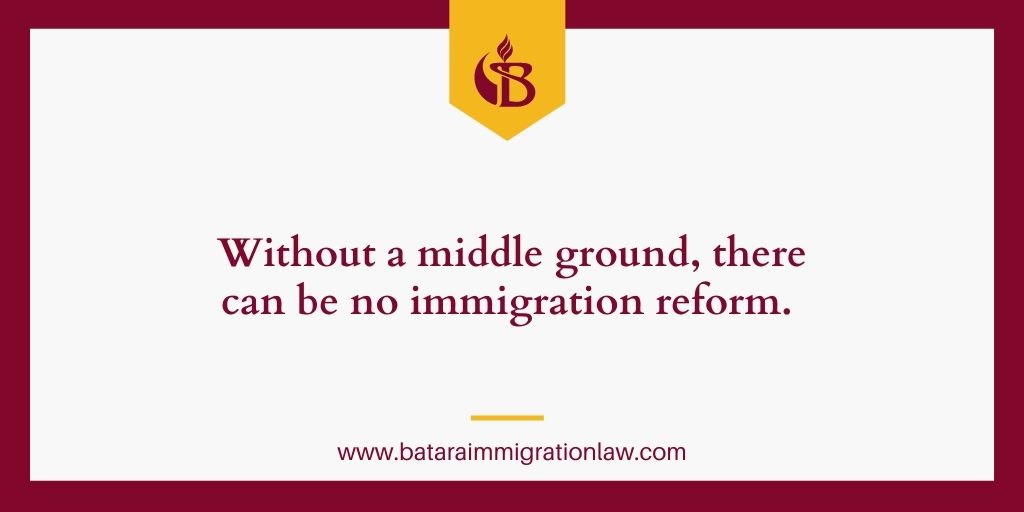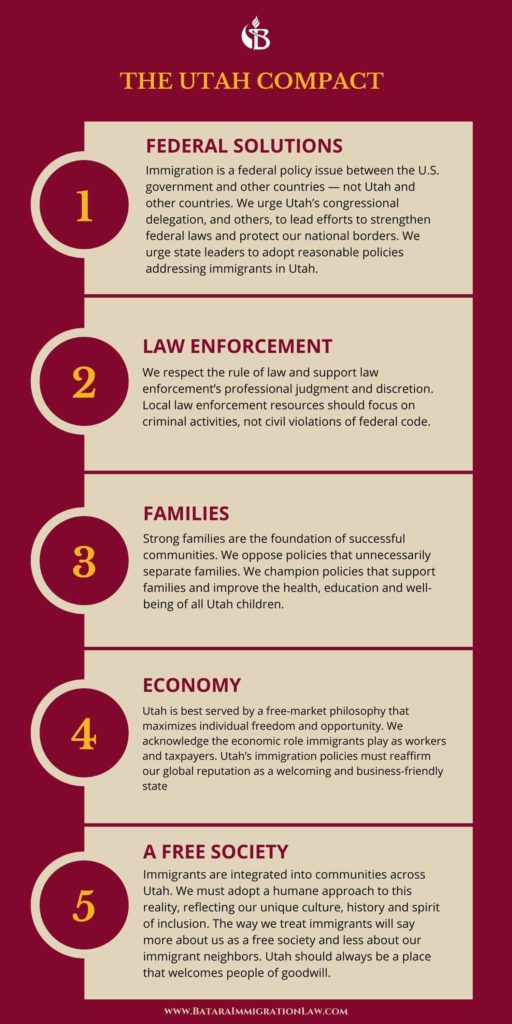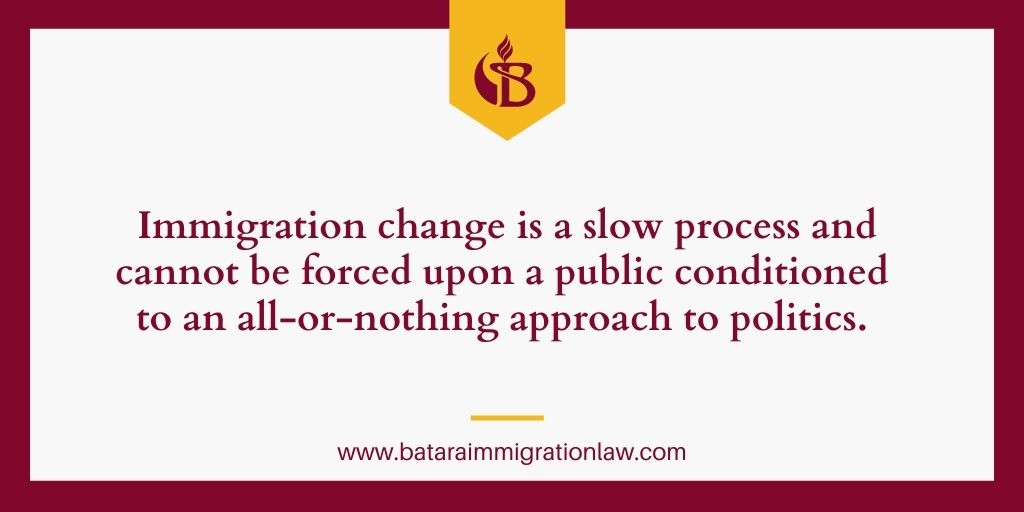
Can a middle ground be found for immigration reform?
On the surface, the art of diplomacy seems permanently lost in Congress. Compromise appears impossible.
Far too many immigration opponents have adopted a rigid law and order stance against undocumented immigrants. They refuse to negotiate on any issues remotely related to comprehensive immigration reform. In their view, the southwest borders must be locked down in order to stop the hijacking of America.
Immigrant advocates, on the other hand, assert that piecemeal solutions are measures too distasteful for rational consideration. Immigrants arriving at the border, regardless of the strength or weakness of their asylum claims, must be granted full access to immigration courts and constitutional protections.
For both camps, immigration reform is a one-way deal.
Yet, having worked in the political arena for over a decade before becoming an immigration attorney in Riverside, I learned a bittersweet truth. Without a middle ground, there can be no lasting progress on tough social issues.
In other words, without a middle ground, there can be no immigration reform.

Fortunately, a thawing-out may be taking place, starting in the State of Utah.
Although Utah is not perceived as one of the country’s centers of immigration, its’ approach to balancing the views of pro-reform and anti-reform constituents is worthy of consideration by not only other states, but also the federal government.
Utah Jumps Into The Immigration Debate
The effort began in 2010. Shortly after Arizona passed an onerous anti-immigration bill, SB 1070, it seemed Utah would follow its southern neighbor’s lead. The knee jerk reaction was not uncommon.
The Arizona law sparked a national wave of social wild fires – illustrated by local events in my neck of the woods, Hemet, Lake Elsinore, Temecula, and other Inland Empire cities – fueled by xenophobic hysteria.
Utah, too, looked ready to draw a strong line against undocumented immigrants. Several public figures and media outlets cast them as criminals, plain and simple. The human side of the immigration debate was largely excluded from Utah’s political framework.
Joining the maddening chorus of 21 states following Arizona’s lead appeared a mere matter of time.
The Utah governor at that time, Gary R. Herbert, made it clear he expected to sign a tough law similar to Arizona SB 1070 before the year ended.
A few events changed the Utah government’s thinking.
First, as the Arizona situation unfolded, the state was hit with several costly lawsuits. Second, economic boycotts began to harm Arizona financially. Third, the unexpected reaction to the release of 1,300 names of Utah residents suspected of being unlawful documents.
Faced with expensive lawsuits, coupled with losing potential tourist business, caused Governor Herbert and his supporters to rethink their policies on immigration.
Yet, perhaps the turning point took place when Alex Segura called Tony Yapias to express his unhappiness with the unlawful release of the 1,300 names.
Segura was the leader of Utah Minutemen Project, an organization vehemently opposed to illegal immigration. Yapias was the host of a popular Spanish-language radio show and a outspoken supporter of immigration reform.
They joined forces to hold a press conference. They asked for the immigration debate to be conducted in a civil manner.
Within days, Governor Herbert convened a meeting with church leaders, business leaders, law enforcement officials, and leading community members to address immigration.
According to the Governor, everyone with an interest in the immigration issue needed to be at the table to express their points of view. “If we do that, then I think the process will lead us to a conclusion – and hopefully a consensus conclusion.”
Backed by the Utah Chamber of Commerce, the Utah Attorney General, and the Mormon Church, three major political forces in the state, the discussions shifted to a more-inclusive approach on immigration.
What Is The Utah Compact On Immigration?
The Utah Compact is a declaration of five core principles, signed by political, business, civic, law enforcement, and religious leaders to guide immigration reform discussions.
It was signed at a public ceremony at the Utah State Capitol on November 11, 2010. Nearly a decade later, it was reaffirmed and resigned on March 21, 2019.
The five principles are based on moderation and civility.
The Five Principles Of The Utah Compact

FEDERAL SOLUTIONS – Immigration is a federal policy issue between the U.S. government and other countries — not Utah and other countries. We urge Utah’s congressional delegation, and others, to lead efforts to strengthen federal laws and protect our national borders. We urge state leaders to adopt reasonable policies addressing immigrants in Utah.
LAW ENFORCEMENT – We respect the rule of law and support law enforcement’s professional judgment and discretion. Local law enforcement resources should focus on criminal activities, not civil violations of federal code.
FAMILIES – Strong families are the foundation of successful communities. We oppose policies that unnecessarily separate families. We champion policies that support families and improve the health, education and well-being of all Utah children.
ECONOMY – Utah is best served by a free-market philosophy that maximizes individual freedom and opportunity. We acknowledge the economic role immigrants play as workers and taxpayers. Utah’s immigration policies must reaffirm our global reputation as a welcoming and business-friendly state.
A FREE SOCIETY – Immigrants are integrated into communities across Utah. We must adopt a humane approach to this reality, reflecting our unique culture, history and spirit of inclusion. The way we treat immigrants will say more about us as a free society and less about our immigrant neighbors. Utah should always be a place that welcomes people of goodwill.
Dancing With Policy Dragons: Detractors, Faultfinders, And Naysayers
Despite the Compact’s efforts to outline a common-sense middle road on immigration issues, it is not without critics. On both sides of the political aisle.
Some pro-reform activists have lambasted the Compact for not providing any real solutions or results. In their perspective, the principles are too vague and broad, and serve to justify the hiring of undocumented workers at lower wages by businesses.
Such faultfinders argue that since the Utah Compact was initially introduced over a decade ago, little progress has been made toward reforming the immigration system.
Restrictionist naysayers assert the Compact’s middle-of-the-road approach worsens the state’s problems with undocumented immigrants.
Claiming it encourages undocumented law-breakers to come from Arizona and other less immigrant-friendly places, these cynics allege the Compact has created a perception that Utah is a sanctuary state. This leads, they contend, to a more broken system than before.
Both sets of detractors overlook that true immigration change is a slow process and cannot be forced upon a public conditioned to an all-or-nothing approach to politics.

They vastly minimize how the Compact’s tone changed the direction of immigration reform in Utah – towards conciliation – and might perform the same function in other communities if its guiding principles were put into action.
In my opinion, these types of steadfast objections to political compromise are tantamount to missing the forest for the trees.
Or put more bluntly, such short-sighted fixation reflects a glaring absence of vision.
Cultural Diversity And Public Compromise
In actuality, Utah is not a newcomer to the plight of refugees.
On the contrary, the state’s growing ethnic populations mirror Utah’s heritage as a territory settled by refugees fleeing persecution.
As a recent report by the University of Utah Policy Institute recently noted, approximately 60,000 refugees currently live in Utah.
They come from various countries across the globe, including Venezuela, Peru, Somalia, the Democratic Republic of Congo, Syria, Iraq, Vietnam, the former Soviet Union, Burma, and most recently, Afghanistan.
In the state’s capital and largest city, Salt Lake City, over 30 different languages are spoken in local schools.
Of a total population of 3.42 million, research by the American Immigration Council found that nearly 9%, 1 in 11 residents, are immigrants born in another country. In addition, the AIC found another 9% of the state’s population are native-born Americans with at least one immigrant parent.
Given such demographics, progress on immigration issues is critically important to the state’s future. Solutions must be devised that serve the best interests of all residents.
An Emerging Political Middle: Will Utah Inspire An Immigration Consensus?
Economics also demands immigration reform.
Shortly after the names of undocumented immigrants were released in 2020, a story in the Washington Post quoted a Utah resident who sought Yapias’ help, “I know I broke the law by coming here. But since then, I have done everything I can, like pay taxes and pay bills on times, to ensure I don’t break the rules.”
Based on my experience as an immigration attorney, this statement encapsulates the need for true immigration reform – a new direction on vexing, though not insurmountable, issues.
The immigrant population that lives in the United States without a path to legalization is huge, and most who have been here 10 years or longer have deep ties to this country. Most have families and stable jobs. Many own businesses and homes. To attempt to massively remove them from the United States would rip the heart out of communities across the land.
Such as Utah.
Data from the New American Economy shows that in 2019, immigrants in Utah paid $1.8 billion in federal taxes, $613.4 million in state and local taxes, and held $5.8 in spending power. Over 14,500 businesses are immigrant-owned, generating over $6.3 billion in revenues annually.
When I serve as an immigration deportation defense trial lawyer, the fortunes of my clients often turn on a concept termed “hardship.” In short, this asks how much will an immigrant’s U.S. citizen or lawful permanent resident spouse, minor children, and parents suffer if the immigrant is deported?
The question is directly tied to the current reform debate.
A winner-take-all approach may sound nice in theory, for at least one end of the political spectrum, but the odds of such measures having a lasting impact is slim to none.
A divided public must learn to walk together, even if only in baby steps, before they can run hand-in-hand to more comprehensive legislation.
When immigration opponents start to appreciate the integration of these immigrants into their communities, as in Utah, the nation will finally be able to have sensible discussions aimed at positive solutions, not just negative criticisms.
Although some of the Utah Compact’s wording can be interpreted in multiple ways, the overarching theme is a extraordinary accomplishment of compromise in action.
Public policy that recognizes immigrants as good neighbors.
Public policy that sets a new tone for political debate.
Dialogue and discussion, without rancor and ill-will, is essential for immigration reform.
Given the excruciating stalemate in Congress regarding immigration reform, it’s time for more communities to follow Utah’s footsteps.
By Carlos Batara, Immigration Law, Policy, And Politics




